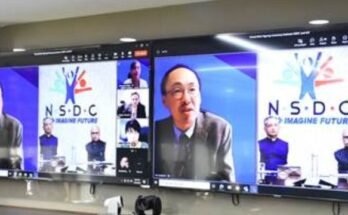New Delhi: The Centre through the skill ministry’s National Skill Development Corporation has started the work of creating a database of skilled workers coming from Gulf and other countries, to keep a pool of skilled labour ready for potential investors when the economy picks up. According to officials, this is being done by tapping on the details shared by the workers, with help from the ministries of external affairs and civil aviation. NSDC is also the nodal agency for the implementation of the government’s flagship skill training programme.
“We are creating a skill India information management system which will have all details about the workers. We already have a massive database, and we are adding to that. It will be final and open for access for companies and states in a few days. This is to match the supply when the demand picks up. Also, we don’t want talent to go waste, and we want information about skilled workers to be readily available when required,” Manish Kumar, CEO of NSDC told ET.
According to officials, the skill ministry had recently collaborated with officials from the ministry of external affairs and civil aviation to create a form to be filled by every skilled worker coming from foreign countries, with details about his or her qualification, experience and contact details for the next year. “The migration counters will share the data with us which we put into the system..When the investment picks up, and if somebody needs welders, electricians or fabrication experts, we want to be able to provide them with the best around the area they want, as soon as possible. This will make it easy for the investors and will also ensure opportunities for those who have come back. We are aware of the uncertainties that these workers might be going through and we are looking at arranging work for them.”
Refer SkillReporter (www.SkillReporter.com) for skill development and The Edupress (www.TheEduPress.com ) for education related important News, Tenders, RFP, Jobs, EOI, Events, Announcements, Circulars, Notices and other useful updates. Content also shared on Facebook Twitter Linkedin
The Government of India has started the repatriation of Indian nationals abroad in a phased manner. According to Kerala government estimates, over 65,000 of these returnees have already cited job losses as the reason for their return.
The NSDC’s portal of skilled workers is being put together at present is powered by Bengaluru-based tech company Betterplace that offers “digital platforms for lifecycle management of the blue-collar staff for hiring, onboarding, verifying, upskilling, attendance tracking, salary, health, either directly or indirectly through businesses who employ such people in large numbers, according to its website.
Kumar said it will have more support in the days to come. “We can always scale up the system as we are already working TCS and IBM in the ministry, he said, adding that sectors such as insurance, health, pharmacy, technical expertise and construction are likely to see a surge in demand in coming days.
The skill ministry has also reached out to States for access to their databases, and seven States have already responded, Kumar said. A similar attempt is also being made to map the more difficult numbers of migrant workers in India that Kumar said will take more time.
As of now, there is no proper data of migrants moving in between States. The office of Chief Labour Commissioner, which had ordered a count of stranded migrant labourers in the country last month, does not have any data on it, the Union Labour Ministry had told an RTI activist Venkatesh Nayak from Commonwealth Human Rights Initiative recently.
“We are aware that the supply of labour in sectors such as construction will be a problem when the demand arises. We are getting in touch with big construction companies such as L&T and others if they have data on the competency of people who work for them. Right now, the challenge of the sector is that it is highly informal. We are exploring ways to partner with big companies who carry out big construction projects, reduce the information asymmetry and subsequently bring down the dependence on middle men to hire labour.”
Note: News shared for public awareness with reference from the information provided at online news portals.



